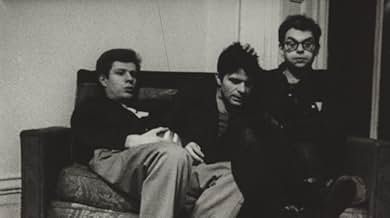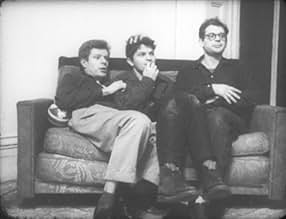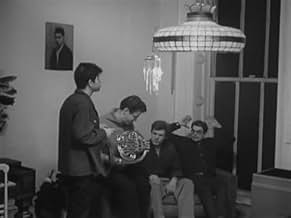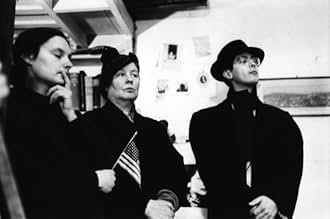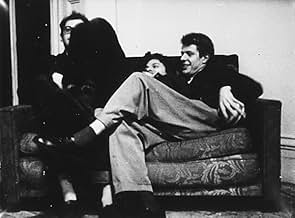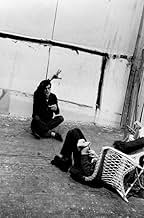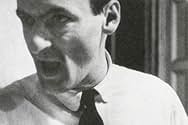Adicionar um enredo no seu idiomaA married couple vainly hopes that their irreverent beat poet friends will behave themselves when the bishop comes to visit.A married couple vainly hopes that their irreverent beat poet friends will behave themselves when the bishop comes to visit.A married couple vainly hopes that their irreverent beat poet friends will behave themselves when the bishop comes to visit.
- Direção
- Roteirista
- Artistas
- Prêmios
- 1 vitória no total
Allen Ginsberg
- Allen
- (as Alan Ginsberg)
Delphine Seyrig
- Milo's Wife
- (as Beltiane)
Richard Bellamy
- Bishop
- (as Mooney Pebbles)
Avaliações em destaque
I, too was taken in by Kerouac's writing when I was adolescent. Free sex with willing babes, philosophy, drugs, travel, adventure, freedom to the max - what could be wrong with that? Why women would be interested in his lifestyle was less apparent to me. He could obviously talk for days and nights. Which together with his ability to remember conversations word for word for a long time makes me think of someone with a light touch of autism. Also the distance to others that is apparent in his writing. In the end he came across as a troubled and melancholy soul. This film gives us a rare view of the environment he spent part of the fifties in together with his chummy beatniks, where a myth was born (and is still being fed by some). You also get his voice over which runs the length of the film and is much like his writing. Endless associations and playful word games, stream of consciousness as they call it. One of the things that now puts me off is the negative depiction of women, in this film and in beat culture overall - unless they are the kind who are easily subordinated and available. Delphine Seyrig as the mother who actually feeds her son and takes him to school is the bad guy here. As is the Bishop's mother with her unamused expression - here you have them both, the mother and the wife from a beat perspective. Seyrig later went on to direct "Scum manifesto", no doubt fed up with a--holes like these jerks who never did the dishes. The talented David Amram wrote the score and plays some horn. He has called Kerouac a genius and one of the greatest of communicators, and I wouldn't mind having spent time with Jack. But I would rather have spent that time say, with Henry Miller, who was more joy than sorrow, and a better writer. Having said his, I too can feel nostalgia when I think of the beat era. I once went to a reading by Ginsberg and Orlovsky and was moved to tears and laughter like the rest of the audience. But, if you want the real story rather than the myth, read Carolyn Casady's "Off the Road" for starters. Btw, this film can be seen at google video.
8tmv9
One of the more quintessential displays of the era of Beat poetry and Bop music. Set in a NYC apartment, the movie is narrated by Jack Keoruac and portrays the life of an artistic 'family'. From painter, poet, and musician, the movie moves quickly without any particular place to go. It strikes at the heart of the movement and should be avoided by anybody who cannot stand the sometimes 'zoned' out babble of this generation. Enjoyable and short, the film fits a small genre of the American experience.
A humorous almost innocent short film starring the Beat poets, alas not Kerouac but the narration which he wrote and speaks is beautiful and funny. In my innocence I was amazed to see the group passing around pot (*I know it was tobacco!) on camera. Thankfully this time capsule is available for viewing online (Open Culture) together with a clip of the poets visiting an East Side bar, filmed at the same time.
Various "Beat Generation" luminaries hang out in a New York apartment. I usually couldn't care less about the Beats, but this short film is fairly absorbing, thanks mostly to Jack Kerouac's vibrant narration. It makes me nostalgic for the '50s, and I wasn't even around back then.
"The first truly beat film" -Jonas Mekas
It is easy to say that Pull My Daisy is the epitome of "beat generation" cinema. It can also be said that Pull My Daisy was the first film to practice the radical beliefs of "The New American Cinema Group". After all the historical and analytical nonsense is done, you are still left with a film that is passionate, personal, and most importantly- a film that entertains while expanding your understanding of art and the artist within a movement.
Pull My Daisy is based on the third act of a play written by beat generation mastermind Jack Kerouac untitled The Beat Generation (which was changed because MGM had the copyright to Beat Generation because of a low budget B-movie made by the studio in the late 50's). The new title was based on a poem written by Kerouac, poet Allen Ginsberg, and Neal Cassady in a be-bop jazz meditation (jazz and meditation- two important aspects of the film!) The film takes place in a New york apartment and never leaves the apartment except in one dream sequence. The cast of characters reads like a who's who of the beat generation: Allen Ginsberg, Gregory Curso, Peter Orvolosky (all of which retain their real names during the film). The film itself is beautifully narrated by Keroauc with a subtle be bop jazz soundtrack. The cast acts like themselves- substance abusing philosophers who sit in lotus positions contemplating life and art. The story picks up with the entrance of a bishop with his mother and sister. He is an outsider who enters this world of poets and must focus on their neo-buddhist rantings of "is baseball holy...etc.".
Where other films of "The New American Cinema" seem detached and unaccessible to the public- Pull My Daisy is an honest and almost affectionate portrait of the beat generation. This is the one film (with a possible inclusion of Cassavette's Shadows) of the movement that expands past the area of modernist-artistic riff-raff and tells a true story that is virtuous and right (yet highly symbolic and leaves the viewer questioning many aspects of life). Pull My Daisy is the shining star of the cannon of "The New American Cinema" and is a film that should forever be preserved for generations of alienated film makers and cinema fans.
It is easy to say that Pull My Daisy is the epitome of "beat generation" cinema. It can also be said that Pull My Daisy was the first film to practice the radical beliefs of "The New American Cinema Group". After all the historical and analytical nonsense is done, you are still left with a film that is passionate, personal, and most importantly- a film that entertains while expanding your understanding of art and the artist within a movement.
Pull My Daisy is based on the third act of a play written by beat generation mastermind Jack Kerouac untitled The Beat Generation (which was changed because MGM had the copyright to Beat Generation because of a low budget B-movie made by the studio in the late 50's). The new title was based on a poem written by Kerouac, poet Allen Ginsberg, and Neal Cassady in a be-bop jazz meditation (jazz and meditation- two important aspects of the film!) The film takes place in a New york apartment and never leaves the apartment except in one dream sequence. The cast of characters reads like a who's who of the beat generation: Allen Ginsberg, Gregory Curso, Peter Orvolosky (all of which retain their real names during the film). The film itself is beautifully narrated by Keroauc with a subtle be bop jazz soundtrack. The cast acts like themselves- substance abusing philosophers who sit in lotus positions contemplating life and art. The story picks up with the entrance of a bishop with his mother and sister. He is an outsider who enters this world of poets and must focus on their neo-buddhist rantings of "is baseball holy...etc.".
Where other films of "The New American Cinema" seem detached and unaccessible to the public- Pull My Daisy is an honest and almost affectionate portrait of the beat generation. This is the one film (with a possible inclusion of Cassavette's Shadows) of the movement that expands past the area of modernist-artistic riff-raff and tells a true story that is virtuous and right (yet highly symbolic and leaves the viewer questioning many aspects of life). Pull My Daisy is the shining star of the cannon of "The New American Cinema" and is a film that should forever be preserved for generations of alienated film makers and cinema fans.
Você sabia?
- CuriosidadesDebut of actress Delphine Seyrig.
- ConexõesFeatured in The Fifties (1997)
Principais escolhas
Faça login para avaliar e ver a lista de recomendações personalizadas
Detalhes
- Tempo de duração30 minutos
- Cor
- Mixagem de som
Contribua para esta página
Sugerir uma alteração ou adicionar conteúdo ausente


